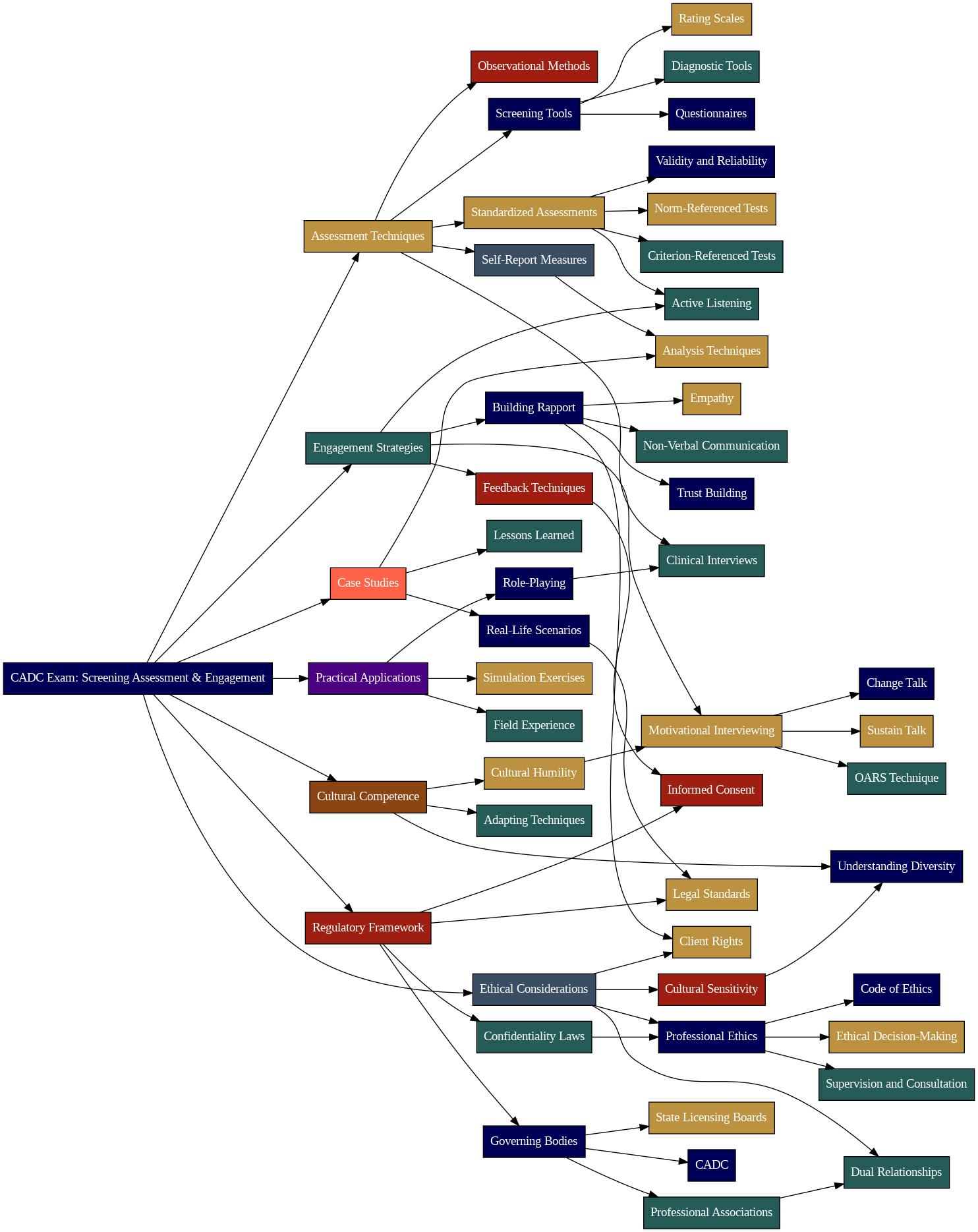Quiz-summary
0 of 29 questions completed
Questions:
- 1
- 2
- 3
- 4
- 5
- 6
- 7
- 8
- 9
- 10
- 11
- 12
- 13
- 14
- 15
- 16
- 17
- 18
- 19
- 20
- 21
- 22
- 23
- 24
- 25
- 26
- 27
- 28
- 29
Information
Premium Practice Questions
You have already completed the quiz before. Hence you can not start it again.
Quiz is loading...
You must sign in or sign up to start the quiz.
You have to finish following quiz, to start this quiz:
Results
0 of 29 questions answered correctly
Your time:
Time has elapsed
Categories
- Not categorized 0%
- 1
- 2
- 3
- 4
- 5
- 6
- 7
- 8
- 9
- 10
- 11
- 12
- 13
- 14
- 15
- 16
- 17
- 18
- 19
- 20
- 21
- 22
- 23
- 24
- 25
- 26
- 27
- 28
- 29
- Answered
- Review
-
Question 1 of 29
1. Question
Dr. Nala Mbatha, an LMLP in Kansas, is working with a new client, Mrs. Park, who recently immigrated from South Korea. Dr. Mbatha notices that Mrs. Park often avoids direct eye contact and speaks softly during sessions. Dr. Mbatha interprets this as a sign of anxiety or discomfort. What would be the most culturally competent approach for Dr. Mbatha to take?
Correct
The American Psychological Association’s (APA) Ethical Principles of Psychologists and Code of Conduct emphasizes the importance of cultural competence in providing psychological services. Cultural competence involves being aware of one’s own cultural values and biases, understanding the client’s cultural background, and adapting interventions to be culturally appropriate. Psychologists should seek education and training to enhance their cultural competence and consult with experts when working with clients from unfamiliar cultural backgrounds. Failure to provide culturally competent services can lead to ineffective treatment and ethical violations.
Incorrect
The American Psychological Association’s (APA) Ethical Principles of Psychologists and Code of Conduct emphasizes the importance of cultural competence in providing psychological services. Cultural competence involves being aware of one’s own cultural values and biases, understanding the client’s cultural background, and adapting interventions to be culturally appropriate. Psychologists should seek education and training to enhance their cultural competence and consult with experts when working with clients from unfamiliar cultural backgrounds. Failure to provide culturally competent services can lead to ineffective treatment and ethical violations.
-
Question 2 of 29
2. Question
A new client, visiting from out of state, contacts Dr. Imani Okoro, a Licensed Master Level Psychologist (LMLP) in Kansas, seeking comprehensive neuropsychological testing for suspected traumatic brain injury (TBI). Dr. Okoro’s supervised experience primarily involves cognitive-behavioral therapy for anxiety and depression, and she has limited formal training in neuropsychological assessment beyond basic screening measures. According to Kansas regulations and ethical guidelines for LMLPs, what is Dr. Okoro’s MOST appropriate course of action?
Correct
In Kansas, an LMLP’s scope of practice is defined by state statutes and regulations. The core principle is that an LMLP practices under supervision, and this supervision must be adequate to ensure competent service delivery and client protection. The supervisor, typically a licensed psychologist (LP), bears the ultimate responsibility for the services provided by the LMLP. The LMLP cannot independently engage in the full scope of psychological practice reserved for LPs. An LMLP must not misrepresent their qualifications or scope of practice to clients or the public. Ethical guidelines, including those from the APA, also emphasize the importance of accurate representation of credentials and competence. Kansas regulations directly address the supervisory relationship, defining the responsibilities of both the supervisor and the supervisee. The LMLP is obligated to practice only within the boundaries of their competence and training, and to seek appropriate consultation or supervision when facing situations outside of their expertise. This aligns with the APA’s ethical principle of competence, which requires psychologists to provide services only in areas where they have sufficient education, training, supervised experience, consultation, study, or professional experience. This framework is designed to protect the public by ensuring that psychological services are delivered competently and ethically.
Incorrect
In Kansas, an LMLP’s scope of practice is defined by state statutes and regulations. The core principle is that an LMLP practices under supervision, and this supervision must be adequate to ensure competent service delivery and client protection. The supervisor, typically a licensed psychologist (LP), bears the ultimate responsibility for the services provided by the LMLP. The LMLP cannot independently engage in the full scope of psychological practice reserved for LPs. An LMLP must not misrepresent their qualifications or scope of practice to clients or the public. Ethical guidelines, including those from the APA, also emphasize the importance of accurate representation of credentials and competence. Kansas regulations directly address the supervisory relationship, defining the responsibilities of both the supervisor and the supervisee. The LMLP is obligated to practice only within the boundaries of their competence and training, and to seek appropriate consultation or supervision when facing situations outside of their expertise. This aligns with the APA’s ethical principle of competence, which requires psychologists to provide services only in areas where they have sufficient education, training, supervised experience, consultation, study, or professional experience. This framework is designed to protect the public by ensuring that psychological services are delivered competently and ethically.
-
Question 3 of 29
3. Question
Dr. Anya Sharma, an LMLP in Kansas, is working with a 10-year-old client, David, who discloses during a session that his stepfather often yells at him and locks him in his room for extended periods as punishment. David begs Dr. Sharma not to tell anyone, fearing his stepfather will be even angrier. According to Kansas law and ethical guidelines, what is Dr. Sharma’s most appropriate course of action?
Correct
According to the Kansas Statutes Annotated (K.S.A.) 74-5310, mandatory reporting is required when a licensed psychologist has reasonable cause to suspect that a child is suffering from physical, mental, or emotional abuse or neglect. This duty supersedes confidentiality. The psychologist is obligated to report such suspicions to the Kansas Department for Children and Families (DCF) or law enforcement. Failing to report suspected child abuse or neglect can result in legal penalties for the psychologist. This responsibility is designed to protect vulnerable individuals and uphold ethical standards in professional practice. The psychologist must act in the best interest of the child, even if it means breaching confidentiality. This is a critical aspect of ethical and legal compliance for LMLPs in Kansas.
Incorrect
According to the Kansas Statutes Annotated (K.S.A.) 74-5310, mandatory reporting is required when a licensed psychologist has reasonable cause to suspect that a child is suffering from physical, mental, or emotional abuse or neglect. This duty supersedes confidentiality. The psychologist is obligated to report such suspicions to the Kansas Department for Children and Families (DCF) or law enforcement. Failing to report suspected child abuse or neglect can result in legal penalties for the psychologist. This responsibility is designed to protect vulnerable individuals and uphold ethical standards in professional practice. The psychologist must act in the best interest of the child, even if it means breaching confidentiality. This is a critical aspect of ethical and legal compliance for LMLPs in Kansas.
-
Question 4 of 29
4. Question
A Licensed Master Level Psychologist (LMLP) in Kansas is treating a client with a history of anxiety and depression. The client requests access to their complete psychological record, including raw test data and the psychologist’s interpretations. The LMLP is concerned that the client may misinterpret the complex statistical data from a personality assessment, leading to increased anxiety. Under Kansas regulations and the APA Ethical Principles, what is the MOST appropriate course of action for the LMLP?
Correct
According to Kansas Administrative Regulations (K.A.R.) 102-1-12a, concerning client access to records, a licensed psychologist in Kansas must provide clients with access to their records, including test data and interpretations, unless there is a compelling reason to believe that such access would cause substantial harm to the client’s mental health. The psychologist is permitted to provide a summary of the record if direct access is deemed harmful. This regulation aligns with the ethical principle of respecting client autonomy and promoting their welfare. Withholding records based solely on the client’s inability to understand complex data contradicts both the Kansas regulations and the APA’s Ethical Principles, which emphasize informed consent and the client’s right to information necessary to make informed decisions about their treatment. The psychologist has a responsibility to explain the data in a way that the client can understand, potentially through consultation with another professional or by providing a simplified summary.
Incorrect
According to Kansas Administrative Regulations (K.A.R.) 102-1-12a, concerning client access to records, a licensed psychologist in Kansas must provide clients with access to their records, including test data and interpretations, unless there is a compelling reason to believe that such access would cause substantial harm to the client’s mental health. The psychologist is permitted to provide a summary of the record if direct access is deemed harmful. This regulation aligns with the ethical principle of respecting client autonomy and promoting their welfare. Withholding records based solely on the client’s inability to understand complex data contradicts both the Kansas regulations and the APA’s Ethical Principles, which emphasize informed consent and the client’s right to information necessary to make informed decisions about their treatment. The psychologist has a responsibility to explain the data in a way that the client can understand, potentially through consultation with another professional or by providing a simplified summary.
-
Question 5 of 29
5. Question
Dr. Anya Sharma, a licensed psychologist in Kansas, is supervising Ben Carter, an LMLP. Ben begins providing specialized trauma therapy, an area outside his documented training and experience, without informing Dr. Sharma. Dr. Sharma, focused on administrative tasks, only reviews Ben’s billing records and does not engage in substantive case discussions. According to Kansas regulations and ethical guidelines, what is the most significant ethical and legal concern in this scenario?
Correct
According to the Kansas Statutes Annotated (K.S.A.) 74-5301, et seq., and the Kansas Administrative Regulations (K.A.R.) 102-1-1, et seq., governing the practice of psychology, an LMLP operates under the supervision of a licensed psychologist. This supervision is not merely a formality but requires active and documented oversight. The supervisor holds ultimate responsibility for the psychological services provided by the LMLP. K.A.R. 102-1-12 details the requirements for supervision, including the frequency, format, and documentation of supervisory sessions. The supervisor must ensure that the LMLP is practicing within the scope of their competence and in accordance with ethical and legal standards. Failing to provide adequate supervision, as defined by these regulations, constitutes a violation of the professional standards and can result in disciplinary action against both the supervisor and the LMLP. The specific requirements for supervision hours and content are outlined in K.A.R. 102-1-12, emphasizing the supervisor’s responsibility to review the LMLP’s cases, provide guidance on ethical dilemmas, and ensure adherence to best practices. The APA Ethical Principles also reinforce the importance of competence and responsible conduct, which are directly addressed through proper supervision.
Incorrect
According to the Kansas Statutes Annotated (K.S.A.) 74-5301, et seq., and the Kansas Administrative Regulations (K.A.R.) 102-1-1, et seq., governing the practice of psychology, an LMLP operates under the supervision of a licensed psychologist. This supervision is not merely a formality but requires active and documented oversight. The supervisor holds ultimate responsibility for the psychological services provided by the LMLP. K.A.R. 102-1-12 details the requirements for supervision, including the frequency, format, and documentation of supervisory sessions. The supervisor must ensure that the LMLP is practicing within the scope of their competence and in accordance with ethical and legal standards. Failing to provide adequate supervision, as defined by these regulations, constitutes a violation of the professional standards and can result in disciplinary action against both the supervisor and the LMLP. The specific requirements for supervision hours and content are outlined in K.A.R. 102-1-12, emphasizing the supervisor’s responsibility to review the LMLP’s cases, provide guidance on ethical dilemmas, and ensure adherence to best practices. The APA Ethical Principles also reinforce the importance of competence and responsible conduct, which are directly addressed through proper supervision.
-
Question 6 of 29
6. Question
Dr. Anya Sharma, an LMLP in Kansas specializing in anxiety disorders, begins treating a new client, Omar, who initially presents with generalized anxiety. During the course of therapy, Omar reveals symptoms indicative of a complex trauma history and potential dissociative disorder, areas outside both Dr. Sharma’s and her supervisor’s expertise. Dr. Sharma, wanting to help Omar and fearing a long waitlist for specialized trauma therapists in the area, decides to continue treatment while researching trauma-informed care in her spare time. Which of the following best describes the ethical and legal implications of Dr. Sharma’s decision?
Correct
According to the Kansas Statutes Annotated (K.S.A.) 74-5310, a Licensed Master Level Psychologist (LMLP) in Kansas must practice under the supervision of a licensed psychologist. This supervision is not merely a formality; it’s a critical component ensuring ethical and competent service delivery. K.S.A. 74-5324 outlines the grounds for disciplinary actions, which include practicing outside the scope of competence and violating ethical standards. The APA’s Ethical Principles of Psychologists and Code of Conduct, specifically Standard 2.01(b), addresses competence, stating that psychologists provide services within the boundaries of their competence, based on their education, training, supervised experience, consultation, study, or professional experience. When an LMLP encounters a client presenting with symptoms or a condition outside their supervisor’s area of expertise and their own training, continuing to treat that client without proper consultation or referral would be a violation of both Kansas law and APA ethical standards. This scenario highlights the importance of recognizing one’s limitations and seeking appropriate support or making necessary referrals to protect the client’s welfare. Continuing treatment could lead to harm, violating the principle of nonmaleficence. It also undermines the integrity of the profession by presenting oneself as competent in areas where one lacks adequate training. The supervisor also bears responsibility for ensuring appropriate supervision and guidance.
Incorrect
According to the Kansas Statutes Annotated (K.S.A.) 74-5310, a Licensed Master Level Psychologist (LMLP) in Kansas must practice under the supervision of a licensed psychologist. This supervision is not merely a formality; it’s a critical component ensuring ethical and competent service delivery. K.S.A. 74-5324 outlines the grounds for disciplinary actions, which include practicing outside the scope of competence and violating ethical standards. The APA’s Ethical Principles of Psychologists and Code of Conduct, specifically Standard 2.01(b), addresses competence, stating that psychologists provide services within the boundaries of their competence, based on their education, training, supervised experience, consultation, study, or professional experience. When an LMLP encounters a client presenting with symptoms or a condition outside their supervisor’s area of expertise and their own training, continuing to treat that client without proper consultation or referral would be a violation of both Kansas law and APA ethical standards. This scenario highlights the importance of recognizing one’s limitations and seeking appropriate support or making necessary referrals to protect the client’s welfare. Continuing treatment could lead to harm, violating the principle of nonmaleficence. It also undermines the integrity of the profession by presenting oneself as competent in areas where one lacks adequate training. The supervisor also bears responsibility for ensuring appropriate supervision and guidance.
-
Question 7 of 29
7. Question
Dr. Anya Sharma, an LMLP in Kansas, is treating a client, Mr. Kenji Tanaka, for severe anxiety. During a session, Mr. Tanaka reveals a detailed plan to harm his former supervisor, stating, “She ruined my career, and she deserves to pay.” He has a history of impulsive behavior but has never acted violently. According to Kansas regulations and ethical guidelines for LMLPs, what is Dr. Sharma’s most appropriate course of action?
Correct
In Kansas, an LMLP (Licensed Master Level Psychologist) is obligated to adhere to specific ethical guidelines concerning client confidentiality, particularly when dealing with potentially harmful situations. According to Kansas statutes and the APA Ethical Principles, an LMLP has a duty to protect clients and others from harm. This duty supersedes confidentiality when there is an imminent risk of serious harm. The Tarasoff ruling and its progeny, while not directly codified in Kansas statutes, inform the interpretation of the duty to protect. If a client expresses a clear and imminent threat of serious harm to a specific, identifiable victim or victims, the LMLP is obligated to take reasonable steps to protect the intended victim(s). Reasonable steps may include warning the potential victim(s), notifying law enforcement, or taking other actions necessary to prevent the harm. The decision to breach confidentiality must be made carefully, considering the severity and likelihood of the threatened harm, the identifiability of the victim(s), and the potential consequences of breaching or not breaching confidentiality. The LMLP should document the decision-making process, including consultations with colleagues or supervisors, and the actions taken. Failing to take appropriate action in such situations could result in legal liability and ethical sanctions.
Incorrect
In Kansas, an LMLP (Licensed Master Level Psychologist) is obligated to adhere to specific ethical guidelines concerning client confidentiality, particularly when dealing with potentially harmful situations. According to Kansas statutes and the APA Ethical Principles, an LMLP has a duty to protect clients and others from harm. This duty supersedes confidentiality when there is an imminent risk of serious harm. The Tarasoff ruling and its progeny, while not directly codified in Kansas statutes, inform the interpretation of the duty to protect. If a client expresses a clear and imminent threat of serious harm to a specific, identifiable victim or victims, the LMLP is obligated to take reasonable steps to protect the intended victim(s). Reasonable steps may include warning the potential victim(s), notifying law enforcement, or taking other actions necessary to prevent the harm. The decision to breach confidentiality must be made carefully, considering the severity and likelihood of the threatened harm, the identifiability of the victim(s), and the potential consequences of breaching or not breaching confidentiality. The LMLP should document the decision-making process, including consultations with colleagues or supervisors, and the actions taken. Failing to take appropriate action in such situations could result in legal liability and ethical sanctions.
-
Question 8 of 29
8. Question
Dr. Samir Patel, a psychologist in Kansas, uses an electronic health record (EHR) system to store and manage his clients’ protected health information (PHI). According to the HIPAA Security Rule, what is Dr. Patel’s PRIMARY responsibility regarding the security of this ePHI?
Correct
The Health Insurance Portability and Accountability Act (HIPAA) Security Rule establishes national standards for protecting the confidentiality, integrity, and availability of electronic protected health information (ePHI). This rule requires covered entities, including psychologists who transmit health information electronically, to implement administrative, physical, and technical safeguards to ensure the security of ePHI. Administrative safeguards include policies and procedures for managing security risks, workforce training, and business associate agreements. Physical safeguards include measures to protect physical access to ePHI, such as facility access controls, workstation security, and device and media controls. Technical safeguards include measures to control access to ePHI electronically, such as access controls, audit controls, integrity controls, and transmission security. Psychologists must conduct a risk analysis to identify potential threats and vulnerabilities to ePHI and implement security measures to mitigate those risks. They must also regularly review and update their security practices to ensure they remain effective. The HIPAA Breach Notification Rule requires covered entities to notify individuals, the Department of Health and Human Services (HHS), and, in some cases, the media, when there is a breach of unsecured PHI. A breach is defined as the unauthorized acquisition, access, use, or disclosure of PHI that compromises the security or privacy of the information. Psychologists must have policies and procedures in place for detecting and responding to breaches, including conducting a risk assessment to determine the likelihood that the PHI has been compromised and providing timely notification to affected individuals.
Incorrect
The Health Insurance Portability and Accountability Act (HIPAA) Security Rule establishes national standards for protecting the confidentiality, integrity, and availability of electronic protected health information (ePHI). This rule requires covered entities, including psychologists who transmit health information electronically, to implement administrative, physical, and technical safeguards to ensure the security of ePHI. Administrative safeguards include policies and procedures for managing security risks, workforce training, and business associate agreements. Physical safeguards include measures to protect physical access to ePHI, such as facility access controls, workstation security, and device and media controls. Technical safeguards include measures to control access to ePHI electronically, such as access controls, audit controls, integrity controls, and transmission security. Psychologists must conduct a risk analysis to identify potential threats and vulnerabilities to ePHI and implement security measures to mitigate those risks. They must also regularly review and update their security practices to ensure they remain effective. The HIPAA Breach Notification Rule requires covered entities to notify individuals, the Department of Health and Human Services (HHS), and, in some cases, the media, when there is a breach of unsecured PHI. A breach is defined as the unauthorized acquisition, access, use, or disclosure of PHI that compromises the security or privacy of the information. Psychologists must have policies and procedures in place for detecting and responding to breaches, including conducting a risk assessment to determine the likelihood that the PHI has been compromised and providing timely notification to affected individuals.
-
Question 9 of 29
9. Question
Dr. Anya Sharma, a Licensed Master Level Psychologist (LMLP) in Kansas, has been providing therapy to Kai for several months, submitting claims to Kai’s insurance company with Kai’s written consent. Mid-therapy, Kai revokes their consent for the release of information to the insurance company, informing Dr. Sharma in writing. Which of the following actions should Dr. Sharma take *FIRST* to ensure compliance with Kansas regulations and APA ethical principles?
Correct
According to Kansas Administrative Regulations (K.A.R.) 102-1-12a, concerning client record keeping, a licensed master level psychologist (LMLP) must maintain accurate, current, and pertinent records of all psychological services rendered. These records must include identifying information, dates of service, types of service, significant actions taken, and the outcome of services. K.A.R. 102-1-12a(b)(7) specifically requires that records include “any release of information and the authorization for the release.” This regulation directly addresses confidentiality and the circumstances under which client information can be disclosed. A crucial element is the client’s informed consent for any release of information. If a client revokes consent, this action must be documented, and any further release of information without a valid authorization would violate both Kansas regulations and the APA Ethical Principles, specifically those related to confidentiality (Principle E) and informed consent. The LMLP must immediately cease releasing information upon receiving the revocation and document the revocation in the client’s record. Continuing to release information after consent has been revoked would be a clear ethical and legal violation, potentially leading to disciplinary action by the Kansas Behavioral Sciences Regulatory Board (BSRB). Furthermore, the LMLP has a duty to inform the receiving party (the insurance company in this scenario) that the consent has been revoked to prevent any further misuse of the information.
Incorrect
According to Kansas Administrative Regulations (K.A.R.) 102-1-12a, concerning client record keeping, a licensed master level psychologist (LMLP) must maintain accurate, current, and pertinent records of all psychological services rendered. These records must include identifying information, dates of service, types of service, significant actions taken, and the outcome of services. K.A.R. 102-1-12a(b)(7) specifically requires that records include “any release of information and the authorization for the release.” This regulation directly addresses confidentiality and the circumstances under which client information can be disclosed. A crucial element is the client’s informed consent for any release of information. If a client revokes consent, this action must be documented, and any further release of information without a valid authorization would violate both Kansas regulations and the APA Ethical Principles, specifically those related to confidentiality (Principle E) and informed consent. The LMLP must immediately cease releasing information upon receiving the revocation and document the revocation in the client’s record. Continuing to release information after consent has been revoked would be a clear ethical and legal violation, potentially leading to disciplinary action by the Kansas Behavioral Sciences Regulatory Board (BSRB). Furthermore, the LMLP has a duty to inform the receiving party (the insurance company in this scenario) that the consent has been revoked to prevent any further misuse of the information.
-
Question 10 of 29
10. Question
Dr. Anya Sharma, a LMLP in Kansas, is treating a client, Mr. Kenji Tanaka, who discloses during a session that he has been experiencing intense anger towards his neighbor and has been fantasizing about vandalizing his property. Mr. Tanaka explicitly states he would never act on these thoughts, but Dr. Sharma is concerned about the escalating intensity of his anger. Under what specific legal and ethical obligation is Dr. Sharma operating regarding the confidentiality of Mr. Tanaka’s statements in the state of Kansas?
Correct
The Kansas Statutes Annotated (K.S.A.) 74-5323 directly addresses the issue of privileged communication between a client and a psychologist. This statute explicitly outlines the circumstances under which a psychologist is legally obligated to disclose confidential information. These circumstances typically include situations where there is a reasonable suspicion of abuse or neglect of a child or a vulnerable adult, or when a client poses a clear and imminent danger to themselves or others. The duty to report overrides the general principle of confidentiality to protect individuals from harm. Furthermore, Kansas law also aligns with the Health Insurance Portability and Accountability Act (HIPAA), which sets federal standards for protecting sensitive patient health information. While HIPAA establishes a baseline for privacy, state laws like K.S.A. 74-5323 can impose stricter requirements or address specific situations not fully covered by HIPAA. The psychologist must also consider the APA Ethical Principles, which emphasize beneficence and nonmaleficence, guiding psychologists to prioritize the well-being of their clients and the community. When deciding whether to disclose confidential information, a psychologist must carefully balance their ethical obligations to maintain confidentiality with their legal duty to report potential harm, consulting with colleagues or legal counsel as needed to make an informed decision that protects all parties involved.
Incorrect
The Kansas Statutes Annotated (K.S.A.) 74-5323 directly addresses the issue of privileged communication between a client and a psychologist. This statute explicitly outlines the circumstances under which a psychologist is legally obligated to disclose confidential information. These circumstances typically include situations where there is a reasonable suspicion of abuse or neglect of a child or a vulnerable adult, or when a client poses a clear and imminent danger to themselves or others. The duty to report overrides the general principle of confidentiality to protect individuals from harm. Furthermore, Kansas law also aligns with the Health Insurance Portability and Accountability Act (HIPAA), which sets federal standards for protecting sensitive patient health information. While HIPAA establishes a baseline for privacy, state laws like K.S.A. 74-5323 can impose stricter requirements or address specific situations not fully covered by HIPAA. The psychologist must also consider the APA Ethical Principles, which emphasize beneficence and nonmaleficence, guiding psychologists to prioritize the well-being of their clients and the community. When deciding whether to disclose confidential information, a psychologist must carefully balance their ethical obligations to maintain confidentiality with their legal duty to report potential harm, consulting with colleagues or legal counsel as needed to make an informed decision that protects all parties involved.
-
Question 11 of 29
11. Question
Dr. Patel, an LMLP in Kansas, discovers that she inadvertently disclosed confidential client information to an unauthorized third party. Using an ethical decision-making model, what is the FIRST step Dr. Patel should take?
Correct
Ethical decision-making models provide a structured approach to resolving ethical dilemmas in professional practice. One common model involves several steps: (1) identifying the ethical problem, (2) reviewing relevant ethical guidelines and legal standards, (3) considering the perspectives of all stakeholders, (4) generating possible courses of action, (5) evaluating the potential consequences of each course of action, (6) selecting the best course of action based on ethical principles and values, and (7) implementing the chosen course of action and evaluating its outcome. These models emphasize the importance of careful deliberation, consultation, and documentation in the ethical decision-making process. They also highlight the need to consider the potential impact of decisions on all parties involved and to prioritize the well-being of clients and the public.
Incorrect
Ethical decision-making models provide a structured approach to resolving ethical dilemmas in professional practice. One common model involves several steps: (1) identifying the ethical problem, (2) reviewing relevant ethical guidelines and legal standards, (3) considering the perspectives of all stakeholders, (4) generating possible courses of action, (5) evaluating the potential consequences of each course of action, (6) selecting the best course of action based on ethical principles and values, and (7) implementing the chosen course of action and evaluating its outcome. These models emphasize the importance of careful deliberation, consultation, and documentation in the ethical decision-making process. They also highlight the need to consider the potential impact of decisions on all parties involved and to prioritize the well-being of clients and the public.
-
Question 12 of 29
12. Question
Dr. Anya Sharma, a Licensed Master Level Psychologist (LMLP) in Kansas, is approached by her close friend, Marcus, seeking therapy for anxiety. They have been friends for over 10 years, regularly socialize, and are involved in the same community organizations. Considering the ethical guidelines for LMLPs in Kansas and the APA’s stance on dual relationships, what is Dr. Sharma’s most ethically sound course of action?
Correct
In Kansas, LMLPs are obligated to uphold ethical standards as outlined by both the APA and Kansas state law. This scenario specifically addresses dual relationships, which are often complex and require careful consideration. The key principle is to avoid situations where the psychologist’s personal relationships could impair their objectivity, competence, or effectiveness in performing their functions as a psychologist, or risk exploitation or harm to the person with whom the professional relationship exists. Kansas statutes and regulations further define these ethical obligations and potential violations. In this case, accepting a client who is also a close friend can create a conflict of interest, blurring professional boundaries and potentially leading to biased treatment or compromised confidentiality. The LMLP must prioritize the client’s well-being and the integrity of the therapeutic relationship above personal connections. Declining to provide services in this scenario is the most ethical course of action. Referring the friend to another qualified professional ensures that the individual receives appropriate care without the complications of a dual relationship. This decision aligns with the APA’s Ethical Principles of Psychologists and Code of Conduct, specifically addressing multiple relationships.
Incorrect
In Kansas, LMLPs are obligated to uphold ethical standards as outlined by both the APA and Kansas state law. This scenario specifically addresses dual relationships, which are often complex and require careful consideration. The key principle is to avoid situations where the psychologist’s personal relationships could impair their objectivity, competence, or effectiveness in performing their functions as a psychologist, or risk exploitation or harm to the person with whom the professional relationship exists. Kansas statutes and regulations further define these ethical obligations and potential violations. In this case, accepting a client who is also a close friend can create a conflict of interest, blurring professional boundaries and potentially leading to biased treatment or compromised confidentiality. The LMLP must prioritize the client’s well-being and the integrity of the therapeutic relationship above personal connections. Declining to provide services in this scenario is the most ethical course of action. Referring the friend to another qualified professional ensures that the individual receives appropriate care without the complications of a dual relationship. This decision aligns with the APA’s Ethical Principles of Psychologists and Code of Conduct, specifically addressing multiple relationships.
-
Question 13 of 29
13. Question
Dr. Anya Sharma, a Licensed Master Level Psychologist (LMLP) in Kansas, is treating a client, Mr. Ben Carter, who expresses anger towards his supervisor, explicitly stating, “I’m so frustrated I could explode at him.” Later, in the same session, Mr. Carter mentions his supervisor, Mr. David Lee, by name, and states, “He’s making my life a living hell, and I’m going to make him pay.” Considering Kansas law and ethical guidelines for LMLPs, what is Dr. Sharma’s *most* appropriate course of action?
Correct
In Kansas, the duty to protect arises when a therapist determines, or pursuant to the standards of their profession should determine, that a patient presents a serious danger of violence to a readily identifiable victim or victims. This duty, established primarily through case law interpretations of confidentiality statutes, requires the therapist to take reasonable precautions to protect the intended victim. The “readily identifiable” aspect is crucial; the duty is not triggered by vague threats against unspecified individuals. Reasonable precautions might include warning the potential victim, notifying law enforcement, or taking other steps deemed necessary to prevent the threatened violence. The therapist’s actions must be defensible under the standard of care expected of a reasonably prudent LMLP in similar circumstances. Failing to take appropriate action when a duty to protect exists could result in legal liability for the therapist. The Kansas statutes governing mental health professionals prioritize client confidentiality but explicitly allow for breaches of confidentiality when necessary to avert imminent danger to the client or others, aligning with the duty to protect. The therapist’s decision-making process and the actions taken should be thoroughly documented to demonstrate adherence to ethical and legal standards.
Incorrect
In Kansas, the duty to protect arises when a therapist determines, or pursuant to the standards of their profession should determine, that a patient presents a serious danger of violence to a readily identifiable victim or victims. This duty, established primarily through case law interpretations of confidentiality statutes, requires the therapist to take reasonable precautions to protect the intended victim. The “readily identifiable” aspect is crucial; the duty is not triggered by vague threats against unspecified individuals. Reasonable precautions might include warning the potential victim, notifying law enforcement, or taking other steps deemed necessary to prevent the threatened violence. The therapist’s actions must be defensible under the standard of care expected of a reasonably prudent LMLP in similar circumstances. Failing to take appropriate action when a duty to protect exists could result in legal liability for the therapist. The Kansas statutes governing mental health professionals prioritize client confidentiality but explicitly allow for breaches of confidentiality when necessary to avert imminent danger to the client or others, aligning with the duty to protect. The therapist’s decision-making process and the actions taken should be thoroughly documented to demonstrate adherence to ethical and legal standards.
-
Question 14 of 29
14. Question
A client in Kansas requests to review their complete patient file from an LMLP, including all session notes and assessment reports. The client has an outstanding balance for previous sessions. According to HIPAA regulations, what is the LMLP’s MOST appropriate response?
Correct
The Health Insurance Portability and Accountability Act (HIPAA) establishes national standards for protecting the privacy and security of individuals’ protected health information (PHI). The HIPAA Privacy Rule governs the use and disclosure of PHI, while the HIPAA Security Rule sets standards for safeguarding electronic PHI (ePHI). Under HIPAA, clients have specific rights regarding their PHI, including the right to access their records, request amendments, and receive an accounting of disclosures. Psychologists must provide clients with a Notice of Privacy Practices that explains these rights and how their PHI will be used and protected. In this scenario, the client’s request to access their records is a right guaranteed under HIPAA. The LMLP must comply with this request in a timely manner and cannot deny access based solely on the client’s outstanding balance. While the psychologist can pursue legal means to collect the debt, they cannot withhold the client’s records as leverage.
Incorrect
The Health Insurance Portability and Accountability Act (HIPAA) establishes national standards for protecting the privacy and security of individuals’ protected health information (PHI). The HIPAA Privacy Rule governs the use and disclosure of PHI, while the HIPAA Security Rule sets standards for safeguarding electronic PHI (ePHI). Under HIPAA, clients have specific rights regarding their PHI, including the right to access their records, request amendments, and receive an accounting of disclosures. Psychologists must provide clients with a Notice of Privacy Practices that explains these rights and how their PHI will be used and protected. In this scenario, the client’s request to access their records is a right guaranteed under HIPAA. The LMLP must comply with this request in a timely manner and cannot deny access based solely on the client’s outstanding balance. While the psychologist can pursue legal means to collect the debt, they cannot withhold the client’s records as leverage.
-
Question 15 of 29
15. Question
During a therapy session, a client, David, expresses anger towards his neighbor and makes a vague statement about “teaching him a lesson.” While David has no history of violence, the LMLP, Sarah, is concerned about the potential for harm. According to the APA Ethical Principles and considering the duty to protect in Kansas, what is Sarah’s MOST appropriate course of action?
Correct
According to Kansas statutes and the APA Ethical Principles, maintaining client confidentiality is paramount. Psychologists are obligated to protect client information unless there is a legal or ethical justification for disclosure. Exceptions to confidentiality include situations where there is a risk of harm to self or others, legal mandates such as reporting child abuse or neglect, or a valid court order. The Tarasoff duty, established in California and adopted in varying forms across different states, addresses the psychologist’s duty to protect third parties from harm. In Kansas, while there may not be a direct statutory equivalent to Tarasoff, the ethical principle of beneficence (doing good) and non-maleficence (doing no harm) guides psychologists to take reasonable steps to protect potential victims when a client poses a credible threat of serious harm. This may involve warning the potential victim, notifying law enforcement, or taking other actions necessary to prevent harm. The psychologist must carefully document the assessment of risk and the steps taken to protect others.
Incorrect
According to Kansas statutes and the APA Ethical Principles, maintaining client confidentiality is paramount. Psychologists are obligated to protect client information unless there is a legal or ethical justification for disclosure. Exceptions to confidentiality include situations where there is a risk of harm to self or others, legal mandates such as reporting child abuse or neglect, or a valid court order. The Tarasoff duty, established in California and adopted in varying forms across different states, addresses the psychologist’s duty to protect third parties from harm. In Kansas, while there may not be a direct statutory equivalent to Tarasoff, the ethical principle of beneficence (doing good) and non-maleficence (doing no harm) guides psychologists to take reasonable steps to protect potential victims when a client poses a credible threat of serious harm. This may involve warning the potential victim, notifying law enforcement, or taking other actions necessary to prevent harm. The psychologist must carefully document the assessment of risk and the steps taken to protect others.
-
Question 16 of 29
16. Question
Dr. Imani, a newly licensed LMLP in Kansas, opens a private practice specializing in treating adolescents with anxiety disorders. She advertises her services as “Comprehensive Psychological Services for Adolescents” without explicitly mentioning her supervised status. She is highly competent in CBT techniques for anxiety, but occasionally consults with her supervisor, Dr. Chen, regarding complex family dynamics that arise in some cases. A parent complains to the Kansas Behavioral Sciences Regulatory Board (BSRB) after discovering Dr. Imani is an LMLP and not a fully licensed psychologist. Which of the following statements BEST represents the ethical and legal implications of Dr. Imani’s actions?
Correct
According to the Kansas Statutes Annotated (K.S.A.) 74-5301 et seq., the Kansas Behavioral Sciences Regulatory Board (BSRB) oversees the licensure and regulation of psychologists, including LMLPs. An LMLP in Kansas operates under specific ethical guidelines and scope of practice limitations. One critical aspect is the requirement for supervision, particularly when practicing independently. K.S.A. 74-5310 details the permissible scope of practice and the necessary supervision requirements for LMLPs. An LMLP must practice under the supervision of a licensed psychologist or another qualified mental health professional approved by the BSRB. The level and type of supervision required depend on the LMLP’s experience and the complexity of the cases they handle. Ethical practice mandates that the LMLP accurately represent their qualifications and the supervisory relationship to clients. Failing to disclose the supervisory relationship or misrepresenting one’s competence constitutes an ethical violation that could lead to disciplinary action by the BSRB. The ethical codes of the American Psychological Association (APA) also emphasize the importance of practicing within one’s competence and obtaining appropriate supervision when necessary. Moreover, Kansas law dictates specific continuing education requirements for license renewal, ensuring ongoing competence and ethical awareness.
Incorrect
According to the Kansas Statutes Annotated (K.S.A.) 74-5301 et seq., the Kansas Behavioral Sciences Regulatory Board (BSRB) oversees the licensure and regulation of psychologists, including LMLPs. An LMLP in Kansas operates under specific ethical guidelines and scope of practice limitations. One critical aspect is the requirement for supervision, particularly when practicing independently. K.S.A. 74-5310 details the permissible scope of practice and the necessary supervision requirements for LMLPs. An LMLP must practice under the supervision of a licensed psychologist or another qualified mental health professional approved by the BSRB. The level and type of supervision required depend on the LMLP’s experience and the complexity of the cases they handle. Ethical practice mandates that the LMLP accurately represent their qualifications and the supervisory relationship to clients. Failing to disclose the supervisory relationship or misrepresenting one’s competence constitutes an ethical violation that could lead to disciplinary action by the BSRB. The ethical codes of the American Psychological Association (APA) also emphasize the importance of practicing within one’s competence and obtaining appropriate supervision when necessary. Moreover, Kansas law dictates specific continuing education requirements for license renewal, ensuring ongoing competence and ethical awareness.
-
Question 17 of 29
17. Question
An LMLP in Kansas, Dr. Imani, consistently finds that her supervising psychologist, Dr. Reynolds, is unavailable for consultation despite scheduled supervision meetings. Dr. Imani has documented multiple instances where Dr. Reynolds has canceled meetings at the last minute or has been unresponsive to urgent clinical questions regarding complex cases. Dr. Imani is concerned about the potential ethical and legal ramifications of continuing to practice under what she perceives as inadequate supervision. According to Kansas statutes and ethical guidelines for LMLPs, what is Dr. Imani’s MOST appropriate course of action?
Correct
According to the Kansas Statutes Annotated (K.S.A.) 74-5310(a)(1)(A), a Licensed Master Level Psychologist (LMLP) in Kansas must practice under the supervision of a psychologist licensed at the doctoral level or a person deemed qualified by the Behavioral Sciences Regulatory Board (BSRB). The level of supervision must be appropriate to the LMLP’s competence and the services they are providing. The LMLP is responsible for ensuring that the supervising psychologist is fully aware of the clients they are seeing and the treatment plans being implemented. The supervisor must provide guidance and oversight, especially in complex or high-risk cases. The LMLP cannot independently provide services that exceed their training and competence or that are outside the scope of the supervisory relationship. Ethical guidelines, as outlined by the APA and the BSRB, emphasize the importance of ensuring client welfare and avoiding harm, which is supported by appropriate supervision. In this scenario, if the supervisor is consistently unavailable and does not provide adequate guidance, it places the LMLP in an ethically precarious position. The LMLP has a responsibility to address the issue with the supervisor, document the attempts to resolve it, and, if necessary, report the situation to the BSRB to ensure client safety and compliance with Kansas regulations. Continuing to practice without adequate supervision would be a violation of both ethical principles and state law.
Incorrect
According to the Kansas Statutes Annotated (K.S.A.) 74-5310(a)(1)(A), a Licensed Master Level Psychologist (LMLP) in Kansas must practice under the supervision of a psychologist licensed at the doctoral level or a person deemed qualified by the Behavioral Sciences Regulatory Board (BSRB). The level of supervision must be appropriate to the LMLP’s competence and the services they are providing. The LMLP is responsible for ensuring that the supervising psychologist is fully aware of the clients they are seeing and the treatment plans being implemented. The supervisor must provide guidance and oversight, especially in complex or high-risk cases. The LMLP cannot independently provide services that exceed their training and competence or that are outside the scope of the supervisory relationship. Ethical guidelines, as outlined by the APA and the BSRB, emphasize the importance of ensuring client welfare and avoiding harm, which is supported by appropriate supervision. In this scenario, if the supervisor is consistently unavailable and does not provide adequate guidance, it places the LMLP in an ethically precarious position. The LMLP has a responsibility to address the issue with the supervisor, document the attempts to resolve it, and, if necessary, report the situation to the BSRB to ensure client safety and compliance with Kansas regulations. Continuing to practice without adequate supervision would be a violation of both ethical principles and state law.
-
Question 18 of 29
18. Question
Dr. Patel, an LMLP in Kansas, is approached by a former client, Javier, whom she treated for anxiety several years ago. Javier invites Dr. Patel to his wedding. What is the MOST ethically appropriate course of action for Dr. Patel to take?
Correct
The ethical practice of psychology in Kansas mandates adherence to strict guidelines regarding informed consent and confidentiality. Informed consent requires that clients are fully informed about the nature of the treatment, potential risks and benefits, alternatives to treatment, and their right to withdraw from treatment at any time. Confidentiality ensures that client information is protected and not disclosed to others without the client’s consent, except in specific circumstances such as mandated reporting of child abuse or threats of harm to self or others. These principles are enshrined in the APA Ethics Code and further elaborated in Kansas state laws and regulations. Dual relationships, where the psychologist has a personal relationship with a client in addition to the professional one, are generally discouraged due to the potential for conflicts of interest and exploitation. Boundaries must be carefully maintained to ensure the integrity of the therapeutic relationship and avoid harm to the client.
Incorrect
The ethical practice of psychology in Kansas mandates adherence to strict guidelines regarding informed consent and confidentiality. Informed consent requires that clients are fully informed about the nature of the treatment, potential risks and benefits, alternatives to treatment, and their right to withdraw from treatment at any time. Confidentiality ensures that client information is protected and not disclosed to others without the client’s consent, except in specific circumstances such as mandated reporting of child abuse or threats of harm to self or others. These principles are enshrined in the APA Ethics Code and further elaborated in Kansas state laws and regulations. Dual relationships, where the psychologist has a personal relationship with a client in addition to the professional one, are generally discouraged due to the potential for conflicts of interest and exploitation. Boundaries must be carefully maintained to ensure the integrity of the therapeutic relationship and avoid harm to the client.
-
Question 19 of 29
19. Question
Dr. Anya Sharma, a Licensed Psychologist (LP) in Kansas, is supervising Ben Carter, an LMLP. Ben is providing therapy to a client struggling with severe anxiety. During a session, Ben implements a novel intervention technique he learned from an unverified online source, without discussing it with Dr. Sharma beforehand. The client experiences a significant adverse reaction. According to Kansas regulations for LMLPs, who bears the ultimate ethical and legal responsibility for the client’s well-being in this situation?
Correct
According to Kansas statutes and regulations concerning LMLPs, specifically K.S.A. 74-5301 et seq. and K.A.R. 102-1-1 et seq., an LMLP in Kansas operates under defined scopes of practice and supervision requirements. An LMLP cannot independently practice without appropriate supervision as stipulated by the Kansas Behavioral Sciences Regulatory Board (BSRB). The supervisor, a licensed psychologist (LP) or a similarly qualified professional as determined by the BSRB, bears the responsibility for ensuring the LMLP’s adherence to ethical guidelines, competent practice, and compliance with state laws. The supervisor is ultimately accountable for the services provided by the LMLP under their supervision. The LMLP must clearly communicate their supervised status to clients, ensuring transparency and informed consent. Furthermore, the regulations specify the required frequency and nature of supervision, emphasizing the supervisor’s role in reviewing cases, providing guidance, and evaluating the LMLP’s performance. Therefore, in the scenario presented, the supervisor holds the ultimate responsibility for the ethical and legal conduct of the supervisee’s actions within the professional setting.
Incorrect
According to Kansas statutes and regulations concerning LMLPs, specifically K.S.A. 74-5301 et seq. and K.A.R. 102-1-1 et seq., an LMLP in Kansas operates under defined scopes of practice and supervision requirements. An LMLP cannot independently practice without appropriate supervision as stipulated by the Kansas Behavioral Sciences Regulatory Board (BSRB). The supervisor, a licensed psychologist (LP) or a similarly qualified professional as determined by the BSRB, bears the responsibility for ensuring the LMLP’s adherence to ethical guidelines, competent practice, and compliance with state laws. The supervisor is ultimately accountable for the services provided by the LMLP under their supervision. The LMLP must clearly communicate their supervised status to clients, ensuring transparency and informed consent. Furthermore, the regulations specify the required frequency and nature of supervision, emphasizing the supervisor’s role in reviewing cases, providing guidance, and evaluating the LMLP’s performance. Therefore, in the scenario presented, the supervisor holds the ultimate responsibility for the ethical and legal conduct of the supervisee’s actions within the professional setting.
-
Question 20 of 29
20. Question
Dr. Anya Sharma, a recently licensed LMLP in Kansas, is contracted to provide counseling services at a rural community mental health center. She is being supervised by Dr. Ben Carter, an LP who has been licensed in Kansas for one year. Dr. Sharma discovers that Dr. Carter has not completed any continuing education in supervision. According to Kansas statutes and ethical guidelines, what is Dr. Sharma’s most appropriate course of action?
Correct
The Kansas Statutes Annotated (K.S.A.) 74-5323 outlines the requirements for supervision for LMLPs. It specifies that LMLPs must practice under the supervision of a licensed psychologist (LP) or a licensed master level psychologist (LMLP) who has been licensed for at least two years and has completed continuing education in supervision. The supervisor is responsible for the supervisee’s professional activities, ensuring they adhere to ethical standards and legal requirements. The statute also addresses the frequency and documentation of supervision. K.S.A. 74-5323 emphasizes the importance of qualified supervision to protect the public and ensure competent psychological services. The supervisory relationship must be clearly defined, documented, and regularly reviewed to ensure ethical and effective practice. The ethical guidelines from the American Psychological Association (APA) also play a role, emphasizing the supervisor’s responsibility to monitor the supervisee’s competence, provide constructive feedback, and address any ethical concerns. The supervisor is ultimately accountable for the services provided by the supervisee, and failure to provide adequate supervision can result in disciplinary action.
Incorrect
The Kansas Statutes Annotated (K.S.A.) 74-5323 outlines the requirements for supervision for LMLPs. It specifies that LMLPs must practice under the supervision of a licensed psychologist (LP) or a licensed master level psychologist (LMLP) who has been licensed for at least two years and has completed continuing education in supervision. The supervisor is responsible for the supervisee’s professional activities, ensuring they adhere to ethical standards and legal requirements. The statute also addresses the frequency and documentation of supervision. K.S.A. 74-5323 emphasizes the importance of qualified supervision to protect the public and ensure competent psychological services. The supervisory relationship must be clearly defined, documented, and regularly reviewed to ensure ethical and effective practice. The ethical guidelines from the American Psychological Association (APA) also play a role, emphasizing the supervisor’s responsibility to monitor the supervisee’s competence, provide constructive feedback, and address any ethical concerns. The supervisor is ultimately accountable for the services provided by the supervisee, and failure to provide adequate supervision can result in disciplinary action.
-
Question 21 of 29
21. Question
Dr. Ramirez, a Licensed Master Level Psychologist (LMLP) in Kansas, learns from multiple clients that Dr. Nguyen, another LMLP in their community, is consistently billing clients for 60-minute therapy sessions when the sessions are only 45 minutes long. Dr. Ramirez is concerned about the ethical implications but hesitates to report Dr. Nguyen to the Kansas Behavioral Sciences Regulatory Board (BSRB) due to potential professional retaliation. According to Kansas statutes, APA ethical principles, and the role of the BSRB, what is Dr. Ramirez’s most ethically sound course of action?
Correct
According to the Kansas Statutes Annotated (K.S.A.) 74-5310, the Kansas Behavioral Sciences Regulatory Board (BSRB) has the authority to investigate complaints of alleged violations of the statutes and regulations governing the practice of psychology. K.S.A. 74-5324 outlines the disciplinary actions the BSRB can take, including revocation, suspension, or restriction of a license. APA Ethical Standard 1.08 addresses unfair discrimination against complainants and respondents. The Kansas Administrative Regulations (K.A.R.) 102-1-4 details the process for filing complaints with the BSRB. A psychologist licensed in Kansas has a duty to report suspected ethical violations by another psychologist, especially when the conduct raises substantial questions about that psychologist’s competence, integrity, or fitness to practice, as outlined in APA Ethical Standard 1.04. The BSRB’s primary concern is to protect the public, and their investigation would focus on determining if Dr. Nguyen’s actions violated the statutes and regulations governing psychological practice in Kansas. The psychologist’s concern about potential retaliation is a valid consideration, but the duty to report takes precedence when there is reasonable cause to believe that another psychologist has committed an ethical violation that could harm clients or the public. The psychologist should also consult with legal counsel or a trusted colleague to discuss the ethical and legal implications of reporting.
Incorrect
According to the Kansas Statutes Annotated (K.S.A.) 74-5310, the Kansas Behavioral Sciences Regulatory Board (BSRB) has the authority to investigate complaints of alleged violations of the statutes and regulations governing the practice of psychology. K.S.A. 74-5324 outlines the disciplinary actions the BSRB can take, including revocation, suspension, or restriction of a license. APA Ethical Standard 1.08 addresses unfair discrimination against complainants and respondents. The Kansas Administrative Regulations (K.A.R.) 102-1-4 details the process for filing complaints with the BSRB. A psychologist licensed in Kansas has a duty to report suspected ethical violations by another psychologist, especially when the conduct raises substantial questions about that psychologist’s competence, integrity, or fitness to practice, as outlined in APA Ethical Standard 1.04. The BSRB’s primary concern is to protect the public, and their investigation would focus on determining if Dr. Nguyen’s actions violated the statutes and regulations governing psychological practice in Kansas. The psychologist’s concern about potential retaliation is a valid consideration, but the duty to report takes precedence when there is reasonable cause to believe that another psychologist has committed an ethical violation that could harm clients or the public. The psychologist should also consult with legal counsel or a trusted colleague to discuss the ethical and legal implications of reporting.
-
Question 22 of 29
22. Question
Dr. Anya Sharma, a Licensed Master Level Psychologist (LMLP) in Kansas, is providing therapy to a 16-year-old client, Jamie. During a session, Jamie discloses that their older brother, age 20, often leaves them home alone for days without adequate food or supervision, and Jamie feels unsafe. What is Dr. Sharma’s ethical and legal obligation under Kansas law?
Correct
According to the Kansas Statutes Annotated (K.S.A.) 74-5310, psychologists are mandated reporters of suspected child abuse or neglect. This duty arises when the psychologist has reasonable cause to believe that a child is being harmed. The statute emphasizes the importance of protecting children and requires psychologists to act in the best interest of the child. Failing to report suspected abuse can lead to legal consequences, including fines and potential disciplinary actions against the psychologist’s license. In this scenario, the psychologist has received information that raises concerns about the well-being of a child. While it’s crucial to respect client confidentiality, the law prioritizes the safety and protection of children, thereby overriding confidentiality in cases of suspected abuse. The psychologist must act swiftly and report their suspicions to the appropriate authorities, such as the Kansas Department for Children and Families (DCF) or law enforcement. The reporting process typically involves providing details about the child, the suspected abuse, and the reasons for the psychologist’s concern. This reporting obligation ensures that children receive the necessary protection and support.
Incorrect
According to the Kansas Statutes Annotated (K.S.A.) 74-5310, psychologists are mandated reporters of suspected child abuse or neglect. This duty arises when the psychologist has reasonable cause to believe that a child is being harmed. The statute emphasizes the importance of protecting children and requires psychologists to act in the best interest of the child. Failing to report suspected abuse can lead to legal consequences, including fines and potential disciplinary actions against the psychologist’s license. In this scenario, the psychologist has received information that raises concerns about the well-being of a child. While it’s crucial to respect client confidentiality, the law prioritizes the safety and protection of children, thereby overriding confidentiality in cases of suspected abuse. The psychologist must act swiftly and report their suspicions to the appropriate authorities, such as the Kansas Department for Children and Families (DCF) or law enforcement. The reporting process typically involves providing details about the child, the suspected abuse, and the reasons for the psychologist’s concern. This reporting obligation ensures that children receive the necessary protection and support.
-
Question 23 of 29
23. Question
Dr. Anya Sharma, a newly licensed LMLP in Kansas, inherits the caseload of a retiring colleague. Several weeks into treatment with a new client, Mr. Kenji Tanaka, Dr. Sharma realizes that Mr. Tanaka is a distant cousin she hasn’t seen in over 20 years. According to the ethical guidelines set forth by the Kansas Behavioral Sciences Regulatory Board (BSRB) and the APA Ethical Principles, what is Dr. Sharma’s most ethically sound course of action?
Correct
According to the Kansas Statutes Annotated (K.S.A.) 74-5301 et seq., the Kansas Behavioral Sciences Regulatory Board (BSRB) oversees the licensure and regulation of psychologists, including LMLPs. K.S.A. 74-5323 specifically addresses the grounds for disciplinary action, which includes violating the ethical standards adopted by the BSRB. The BSRB has adopted the American Psychological Association’s (APA) Ethical Principles of Psychologists and Code of Conduct as its ethical standard. Standard 3.05 of the APA ethics code addresses multiple relationships. This standard dictates that a psychologist refrains from entering into a multiple relationship if the multiple relationship could reasonably be expected to impair the psychologist’s objectivity, competence, or effectiveness in performing their functions as a psychologist, or otherwise risks exploitation or harm to the person with whom the professional relationship exists. A psychologist inheriting a client from a retiring colleague and subsequently discovering that the client is a distant relative presents a complex ethical situation. The psychologist must evaluate whether this familial relationship compromises their objectivity, competence, or effectiveness, or if it risks exploitation or harm. Simply continuing treatment without addressing this potential conflict would be a violation of APA Ethical Standard 3.05 as adopted by the BSRB in Kansas. Consultation with colleagues is advisable to gain perspective and ensure an unbiased decision.
Incorrect
According to the Kansas Statutes Annotated (K.S.A.) 74-5301 et seq., the Kansas Behavioral Sciences Regulatory Board (BSRB) oversees the licensure and regulation of psychologists, including LMLPs. K.S.A. 74-5323 specifically addresses the grounds for disciplinary action, which includes violating the ethical standards adopted by the BSRB. The BSRB has adopted the American Psychological Association’s (APA) Ethical Principles of Psychologists and Code of Conduct as its ethical standard. Standard 3.05 of the APA ethics code addresses multiple relationships. This standard dictates that a psychologist refrains from entering into a multiple relationship if the multiple relationship could reasonably be expected to impair the psychologist’s objectivity, competence, or effectiveness in performing their functions as a psychologist, or otherwise risks exploitation or harm to the person with whom the professional relationship exists. A psychologist inheriting a client from a retiring colleague and subsequently discovering that the client is a distant relative presents a complex ethical situation. The psychologist must evaluate whether this familial relationship compromises their objectivity, competence, or effectiveness, or if it risks exploitation or harm. Simply continuing treatment without addressing this potential conflict would be a violation of APA Ethical Standard 3.05 as adopted by the BSRB in Kansas. Consultation with colleagues is advisable to gain perspective and ensure an unbiased decision.
-
Question 24 of 29
24. Question
An LMLP in Kansas, under the supervision of a licensed psychologist, consistently disregards their supervisor’s recommendations regarding treatment approaches for clients with severe anxiety disorders, favoring techniques outside the scope of their supervisor’s expertise and against established evidence-based practices. Despite repeated feedback, the LMLP continues this pattern, leading to concerns about client welfare and potential ethical violations. According to Kansas regulations, what is the supervisor’s primary ethical and legal responsibility in this situation?
Correct
According to the Kansas Statutes Annotated (K.S.A.) 74-5310, a Licensed Master Level Psychologist (LMLP) must practice under the supervision of a psychologist licensed at the doctoral level or a similarly qualified mental health professional as defined by the Kansas Behavioral Sciences Regulatory Board (BSRB). This supervision is not merely a formality; it is a crucial component of the LMLP’s practice, ensuring ethical and competent service delivery. The supervisor bears the responsibility for the actions of the LMLP, including the ethical and legal ramifications of their clinical decisions. K.S.A. 74-5324 outlines grounds for disciplinary action, which include violations of ethical standards, professional incompetence, and practicing outside the scope of one’s license and supervision. Therefore, if an LMLP consistently deviates from their supervisor’s guidance, especially in ways that could potentially harm clients or violate ethical principles, it not only undermines the supervisory relationship but also exposes both the LMLP and the supervisor to legal and ethical liability. The supervisor is obligated to take corrective action, which may include additional training, modifying the scope of practice, or, if necessary, terminating the supervisory relationship. The BSRB may also intervene if it determines that the LMLP’s actions constitute a violation of the law or ethical standards.
Incorrect
According to the Kansas Statutes Annotated (K.S.A.) 74-5310, a Licensed Master Level Psychologist (LMLP) must practice under the supervision of a psychologist licensed at the doctoral level or a similarly qualified mental health professional as defined by the Kansas Behavioral Sciences Regulatory Board (BSRB). This supervision is not merely a formality; it is a crucial component of the LMLP’s practice, ensuring ethical and competent service delivery. The supervisor bears the responsibility for the actions of the LMLP, including the ethical and legal ramifications of their clinical decisions. K.S.A. 74-5324 outlines grounds for disciplinary action, which include violations of ethical standards, professional incompetence, and practicing outside the scope of one’s license and supervision. Therefore, if an LMLP consistently deviates from their supervisor’s guidance, especially in ways that could potentially harm clients or violate ethical principles, it not only undermines the supervisory relationship but also exposes both the LMLP and the supervisor to legal and ethical liability. The supervisor is obligated to take corrective action, which may include additional training, modifying the scope of practice, or, if necessary, terminating the supervisory relationship. The BSRB may also intervene if it determines that the LMLP’s actions constitute a violation of the law or ethical standards.
-
Question 25 of 29
25. Question
Dr. Anya Sharma, an LMLP in Kansas, has been working under the supervision of a licensed psychologist, Dr. Ben Carter, for two years. Dr. Sharma has developed a strong interest in forensic psychology and has been independently studying relevant literature and attending workshops. A local attorney approaches Dr. Sharma directly, requesting her to conduct a competency to stand trial evaluation for a defendant. According to Kansas statutes and ethical guidelines for LMLPs, what is the most appropriate course of action for Dr. Sharma?
Correct
The Kansas Statutes Annotated (K.S.A.) 74-5323 addresses the scope of practice for Licensed Master Level Psychologists (LMLPs). This statute outlines specific limitations and requirements for LMLPs, emphasizing the need for supervision and the types of activities they can and cannot perform. An LMLP cannot independently engage in the practice of psychology; they must work under the supervision of a licensed psychologist. The statute also prohibits LMLPs from providing certain specialized services without proper training and supervision, such as neuropsychological testing or forensic evaluations. Additionally, the Kansas Administrative Regulations (K.A.R.) further define the supervisory relationship, specifying the frequency and nature of supervision required. This includes regular face-to-face meetings, case reviews, and documentation of supervisory activities. The regulations also emphasize the supervisor’s responsibility for the LMLP’s ethical conduct and adherence to professional standards. An LMLP’s ethical conduct is also guided by the APA Ethical Principles, which includes competence, integrity, professional responsibility, and concern for others’ welfare. An LMLP must be aware of their limitations and seek appropriate supervision to ensure they are practicing ethically and effectively. Understanding these state-specific regulations and ethical guidelines is crucial for LMLPs to maintain their license and provide competent care.
Incorrect
The Kansas Statutes Annotated (K.S.A.) 74-5323 addresses the scope of practice for Licensed Master Level Psychologists (LMLPs). This statute outlines specific limitations and requirements for LMLPs, emphasizing the need for supervision and the types of activities they can and cannot perform. An LMLP cannot independently engage in the practice of psychology; they must work under the supervision of a licensed psychologist. The statute also prohibits LMLPs from providing certain specialized services without proper training and supervision, such as neuropsychological testing or forensic evaluations. Additionally, the Kansas Administrative Regulations (K.A.R.) further define the supervisory relationship, specifying the frequency and nature of supervision required. This includes regular face-to-face meetings, case reviews, and documentation of supervisory activities. The regulations also emphasize the supervisor’s responsibility for the LMLP’s ethical conduct and adherence to professional standards. An LMLP’s ethical conduct is also guided by the APA Ethical Principles, which includes competence, integrity, professional responsibility, and concern for others’ welfare. An LMLP must be aware of their limitations and seek appropriate supervision to ensure they are practicing ethically and effectively. Understanding these state-specific regulations and ethical guidelines is crucial for LMLPs to maintain their license and provide competent care.
-
Question 26 of 29
26. Question
Dr. Anya Sharma, a Licensed Psychologist (LP) in Kansas, is supervising Ben Carter, an LMLP. Ben has been providing therapy to a client with severe anxiety. Dr. Sharma discovers that Ben has been consistently late for supervision meetings, hasn’t adequately documented his sessions, and has begun offering advice outside of his competency (family law) to the client. Furthermore, the client has filed a complaint with the BSRB due to Ben’s advice. According to Kansas regulations and ethical guidelines, what is Dr. Sharma’s primary responsibility in this situation?
Correct
According to the Kansas Statutes Annotated (K.S.A.) 74-5301 et seq., the Kansas Behavioral Sciences Regulatory Board (BSRB) governs the practice of psychology. An LMLP in Kansas operates under specific supervision requirements outlined in the BSRB regulations. The LMLP must have a written supervision contract with a licensed psychologist (LP) that details the scope of practice, supervision frequency, and methods of supervision. The LP is responsible for the LMLP’s professional activities, including adherence to ethical standards and Kansas laws. The LP must ensure that the LMLP is competent to perform the assigned duties and that the services provided are within the LMLP’s scope of training and experience. The supervision must be documented regularly, and both the LMLP and the LP are accountable for the quality of services provided to clients. This collaborative oversight is designed to protect the public and promote ethical and competent practice. Furthermore, the LP bears the ultimate ethical and legal responsibility for the LMLP’s actions within the scope of the supervisory relationship. Therefore, any scenario involving ethical violations by the LMLP would ultimately involve the supervising LP, who is responsible for ensuring ethical practice and taking corrective action.
Incorrect
According to the Kansas Statutes Annotated (K.S.A.) 74-5301 et seq., the Kansas Behavioral Sciences Regulatory Board (BSRB) governs the practice of psychology. An LMLP in Kansas operates under specific supervision requirements outlined in the BSRB regulations. The LMLP must have a written supervision contract with a licensed psychologist (LP) that details the scope of practice, supervision frequency, and methods of supervision. The LP is responsible for the LMLP’s professional activities, including adherence to ethical standards and Kansas laws. The LP must ensure that the LMLP is competent to perform the assigned duties and that the services provided are within the LMLP’s scope of training and experience. The supervision must be documented regularly, and both the LMLP and the LP are accountable for the quality of services provided to clients. This collaborative oversight is designed to protect the public and promote ethical and competent practice. Furthermore, the LP bears the ultimate ethical and legal responsibility for the LMLP’s actions within the scope of the supervisory relationship. Therefore, any scenario involving ethical violations by the LMLP would ultimately involve the supervising LP, who is responsible for ensuring ethical practice and taking corrective action.
-
Question 27 of 29
27. Question
Dr. Anya Sharma, a Licensed Master Level Psychologist (LMLP) in Kansas, is treating a client named Ben for anxiety. Ben’s sister, Carol, calls Dr. Sharma, stating she’s worried Ben might become suicidal because he’s been isolating himself. Carol demands Dr. Sharma disclose details of Ben’s therapy sessions to help her understand how to support him. According to Kansas statutes and regulations regarding client confidentiality for LMLPs, what is Dr. Sharma’s MOST appropriate course of action?
Correct
According to Kansas statutes and regulations governing LMLPs, specifically K.S.A. 74-5301 et seq. and K.A.R. 102-1-1 et seq., an LMLP must adhere to strict guidelines regarding client confidentiality. While the APA Ethical Principles provide a general framework, Kansas law dictates the specific circumstances under which confidentiality can be breached. Generally, confidential information can be disclosed without client consent when there is a legal mandate, such as a court order, or when there is an imminent risk of harm to the client or others. However, this determination requires careful consideration and documentation. The LMLP must make a reasonable effort to obtain client consent before disclosing information, unless doing so would compromise the safety of the client or others. In situations involving potential harm, the LMLP must document the specific threats, the actions taken to assess the risk, and the consultation sought. Disclosing information solely based on a family member’s request, without a clear indication of imminent danger or a legal mandate, would violate Kansas confidentiality laws. Similarly, simply suspecting potential harm is insufficient; there must be a credible and imminent threat. The LMLP should prioritize the client’s safety and legal obligations, making decisions based on a thorough risk assessment and adherence to Kansas statutes and regulations.
Incorrect
According to Kansas statutes and regulations governing LMLPs, specifically K.S.A. 74-5301 et seq. and K.A.R. 102-1-1 et seq., an LMLP must adhere to strict guidelines regarding client confidentiality. While the APA Ethical Principles provide a general framework, Kansas law dictates the specific circumstances under which confidentiality can be breached. Generally, confidential information can be disclosed without client consent when there is a legal mandate, such as a court order, or when there is an imminent risk of harm to the client or others. However, this determination requires careful consideration and documentation. The LMLP must make a reasonable effort to obtain client consent before disclosing information, unless doing so would compromise the safety of the client or others. In situations involving potential harm, the LMLP must document the specific threats, the actions taken to assess the risk, and the consultation sought. Disclosing information solely based on a family member’s request, without a clear indication of imminent danger or a legal mandate, would violate Kansas confidentiality laws. Similarly, simply suspecting potential harm is insufficient; there must be a credible and imminent threat. The LMLP should prioritize the client’s safety and legal obligations, making decisions based on a thorough risk assessment and adherence to Kansas statutes and regulations.
-
Question 28 of 29
28. Question
Dr. Anya Sharma, a licensed psychologist in Kansas with three years of post-licensure experience, is supervising Ben Carter, who is pursuing his LMLP. Ben begins providing therapy to a client with severe obsessive-compulsive disorder (OCD) using Exposure and Response Prevention (ERP). Dr. Sharma has limited experience with ERP. According to Kansas statutes and regulations regarding LMLP supervision, what is Dr. Sharma’s most ethical and appropriate course of action?
Correct
The Kansas Statutes Annotated (K.S.A.) 74-5323 directly addresses the requirements for supervision of individuals pursuing licensure as Licensed Master Level Psychologists (LMLPs). This statute mandates specific qualifications for supervisors, including being licensed psychologists in Kansas with a minimum of two years of post-licensure experience. Furthermore, the statute delineates the responsibilities of the supervisor, which encompass overseeing the supervisee’s professional activities, providing guidance on ethical and clinical matters, and ensuring the supervisee’s compliance with relevant laws and regulations. The Kansas Administrative Regulations (K.A.R.) 102-1-14 provides further clarification on the supervision requirements, specifying the frequency and duration of supervision sessions, the documentation required, and the criteria for evaluating the supervisee’s performance. It is also crucial for the supervisor to understand the scope of practice for LMLPs as defined by K.S.A. 74-5302, which outlines the permissible activities and limitations of LMLPs in Kansas. A supervisor who delegates responsibilities outside the LMLP’s scope of practice or fails to provide adequate oversight could be held liable for ethical violations or legal ramifications. Additionally, the supervisor must be aware of the reporting requirements outlined in K.S.A. 74-5324 regarding any suspected violations of the psychology licensing act by the supervisee.
Incorrect
The Kansas Statutes Annotated (K.S.A.) 74-5323 directly addresses the requirements for supervision of individuals pursuing licensure as Licensed Master Level Psychologists (LMLPs). This statute mandates specific qualifications for supervisors, including being licensed psychologists in Kansas with a minimum of two years of post-licensure experience. Furthermore, the statute delineates the responsibilities of the supervisor, which encompass overseeing the supervisee’s professional activities, providing guidance on ethical and clinical matters, and ensuring the supervisee’s compliance with relevant laws and regulations. The Kansas Administrative Regulations (K.A.R.) 102-1-14 provides further clarification on the supervision requirements, specifying the frequency and duration of supervision sessions, the documentation required, and the criteria for evaluating the supervisee’s performance. It is also crucial for the supervisor to understand the scope of practice for LMLPs as defined by K.S.A. 74-5302, which outlines the permissible activities and limitations of LMLPs in Kansas. A supervisor who delegates responsibilities outside the LMLP’s scope of practice or fails to provide adequate oversight could be held liable for ethical violations or legal ramifications. Additionally, the supervisor must be aware of the reporting requirements outlined in K.S.A. 74-5324 regarding any suspected violations of the psychology licensing act by the supervisee.
-
Question 29 of 29
29. Question
Dr. Imani, a Kansas LMLP, is treating Kai, who discloses a detailed plan to physically harm a specific coworker, Jordan. Kai has a history of violent behavior and possesses the means to carry out the threat. Considering Kansas laws and ethical guidelines for LMLPs, what is Dr. Imani’s most appropriate course of action?
Correct
In Kansas, the LMLP (Licensed Master Level Psychologist) operates under specific regulations regarding client confidentiality, particularly when dealing with potentially harmful situations. According to Kansas statutes and the APA Ethical Principles, a psychologist has a duty to protect potential victims when a client presents a serious and foreseeable risk of harm to an identifiable third party. This duty overrides general confidentiality rules. The Tarasoff decision and its legal interpretations in different states (including Kansas) emphasize this “duty to protect.” This does not mean breaching confidentiality for vague or unsubstantiated concerns, but rather when a credible threat is made. The psychologist must take reasonable steps, which may include warning the potential victim, notifying law enforcement, or taking other actions to prevent the harm. The psychologist must also document the assessment of risk and the actions taken. Failing to act in such situations can lead to legal and ethical repercussions for the psychologist. The Kansas Behavioral Sciences Regulatory Board (BSRB) provides guidance on these matters, and consultation with legal counsel or ethics experts is often advisable.
Incorrect
In Kansas, the LMLP (Licensed Master Level Psychologist) operates under specific regulations regarding client confidentiality, particularly when dealing with potentially harmful situations. According to Kansas statutes and the APA Ethical Principles, a psychologist has a duty to protect potential victims when a client presents a serious and foreseeable risk of harm to an identifiable third party. This duty overrides general confidentiality rules. The Tarasoff decision and its legal interpretations in different states (including Kansas) emphasize this “duty to protect.” This does not mean breaching confidentiality for vague or unsubstantiated concerns, but rather when a credible threat is made. The psychologist must take reasonable steps, which may include warning the potential victim, notifying law enforcement, or taking other actions to prevent the harm. The psychologist must also document the assessment of risk and the actions taken. Failing to act in such situations can lead to legal and ethical repercussions for the psychologist. The Kansas Behavioral Sciences Regulatory Board (BSRB) provides guidance on these matters, and consultation with legal counsel or ethics experts is often advisable.


























